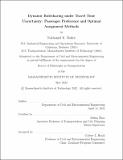Dynamic Ridesharing under Travel Time Uncertainty: Passenger Preference and Optimal Assignment Methods
Author(s)
Bailey, Nathaniel K.
DownloadThesis PDF (3.081Mb)
Advisor
Zhao, Jinhua
Terms of use
Metadata
Show full item recordAbstract
The increased prevalence and use of on-demand ridehailing services through the previous decade have had substantial impacts on urban transportation systems. These services offer convenient and flexible door-to-door transportation to users, but have also raised concerns about system equity, environmental sustainability, and efficiency given their high fares and their resulting increase in vehicle-kilometers traveled. Dynamic ridesharing (DRS; or pooled ridehailing) provides a means to mitigate these negative externalities by offering reduced fares for passengers in exchange for increased operational flexibility in pooling multiple trips into the same vehicle concurrently. However, even prior to their suspension during the COVID-19 pandemic, these services struggled to gain the widespread adoption needed to realize many of these benefits. One under-investigated barrier to the adoption of DRS services is travel time uncertainty. Travel times on urban road networks on which DRS services operate are often highly variable, and the potential for vehicle detours due to pooling increases travel time uncertainty for DRS passengers when compared to exclusive ridehailing.
This dissertation investigates the impact of travel time uncertainty, and traveler perceptions thereof, on decisions of whether to use pooling or not in ridehailing services, and formulates new methods to assign vehicles to passengers in DRS operation that improve passenger outcomes in terms of average delay and travel time variability. Using data collected from a survey of 1,600 Singapore residents, we estimate the impact of different presentations of information regarding travel time variability and associated attitudes on respondents’ stated preference between exclusive and pooled ridehailing trips. We find that different forms of presenting information on the uncertainty of exclusive ridehailing journey times significantly alter passengers’ responses to this uncertainty. However, travelers’ decisions to use DRS are driven much more by their attitudes towards time uncertainty than by the magnitude or means of presentation of the uncertainty. We then formulate a two-stage stochastic optimization formulation for the online DRS assignment problem that minimizes average passenger delay in the presence of stochastic travel times. Through simulation experiments on synthetic road networks with stochastic, correlated travel times, we demonstrate the improved performance of this formulation in finding efficient solutions in a stochastic environment and reducing average passenger delay and the variance of passenger arrival times.
Overall, this dissertation finds that passengers’ lack of trust in DRS reliability is a significant barrier to greater adoption and use, and also demonstrate the potential for operational methods that account for stochastic travel times to increase DRS reliability. This multidisciplinary exploration of the ramifications of travel time uncertainty on the supply and demand of DRS services provides a foundation for future research that may expand upon these concepts, further develop upon the methods used, and create connections between the supply and demand components.
Date issued
2022-05Department
Massachusetts Institute of Technology. Department of Civil and Environmental EngineeringPublisher
Massachusetts Institute of Technology